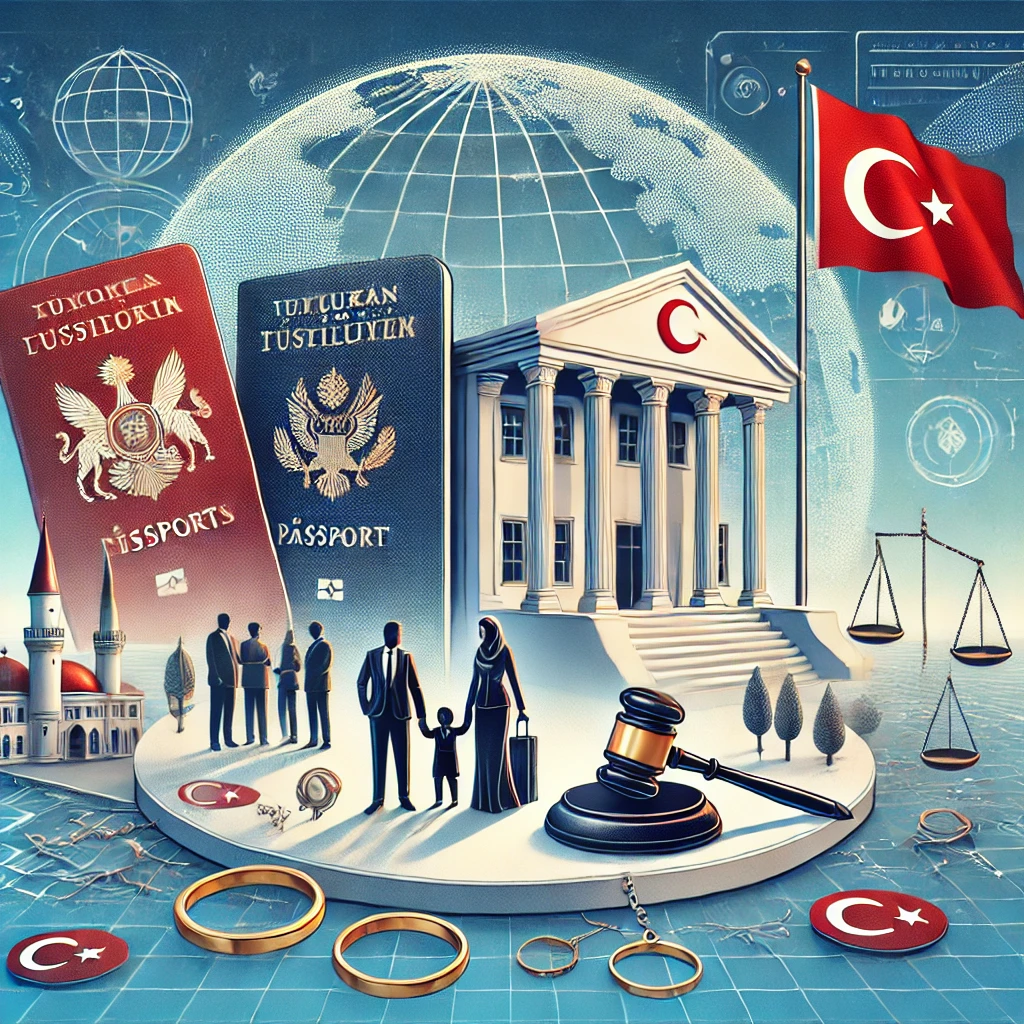Introduction
With increasing globalization, many individuals maintain ties with multiple countries, often resulting in dual citizenship. Dual citizenship, while offering various privileges, also presents legal challenges, especially within the realm of family law. Turkey’s legal framework addresses such issues through Turkish Civil Code (Law No. 4721), international treaties, and private international law principles. This article examines the legal implications of dual citizenship in Turkey with a focus on marriage, divorce, child custody, inheritance, and the challenges of conflicting laws across jurisdictions.
Legal Framework for Dual Citizenship in Turkey
- Acquisition and Recognition of Dual Citizenship
- Turkish law allows individuals to hold multiple nationalities. A Turkish citizen who acquires foreign citizenship does not automatically lose their Turkish nationality unless they apply for renunciation.
- Impact on Family Law: Dual citizens are subject to Turkish law in matters such as marriage registration, divorce proceedings, and inheritance if they reside in Turkey or if the legal relationship is significantly connected to Turkey.
- Private International Law and Dual Citizenship
- Turkey follows the Law on Private International Law and Procedural Law (Law No. 5718) to address conflicts of laws in family matters. When a dual citizen is involved, Turkish courts must determine:
- Which country’s laws will govern the dispute.
- Whether the foreign law is applicable or conflicts with Turkish public policy.
- Turkey follows the Law on Private International Law and Procedural Law (Law No. 5718) to address conflicts of laws in family matters. When a dual citizen is involved, Turkish courts must determine:
Challenges in International Family Law for Dual Citizens
- Marriage and Divorce
- Dual citizens may face complications in marriage and divorce due to differing legal requirements between jurisdictions.
- Recognition of Foreign Marriages: While Turkey recognizes valid marriages performed abroad, procedural issues such as marriage registration may arise.
- Divorce Proceedings: If one spouse initiates a divorce abroad and the other in Turkey, jurisdiction conflicts may emerge. Additionally, foreign divorce decrees may need to undergo recognition and enforcement in Turkish courts for legal validity.
- Child Custody and Parental Rights
- Dual citizenship complicates child custody disputes when parents reside in different countries. Turkish courts typically prioritize the best interests of the child, but conflicting parental rights under foreign laws may lead to complex disputes.
- International Child Abduction: Turkey is a party to the Hague Convention on the Civil Aspects of International Child Abduction. Dual citizenship cases can complicate the convention’s application, as children may be abducted or retained in a country where one of the parents holds nationality.
- Inheritance Law
- Dual citizens with assets in multiple countries may encounter issues related to inheritance and succession law. Turkish law applies forced heirship rules, ensuring that certain family members (such as children and spouses) receive a statutory share of the estate, regardless of any will.
- However, conflict of laws may arise if a foreign legal system has different inheritance rules. Turkish courts assess whether foreign laws conflict with the mandatory rules of Turkish inheritance law.
Jurisdictional and Legal Conflicts in Dual Citizenship Cases
- Public Policy and Non-Application of Foreign Laws
- If a foreign law is deemed contrary to Turkish public policy, it will not be applied. For example, inheritance laws disinheriting children or discriminatory divorce laws may be refused recognition by Turkish courts.
- Recognition and Enforcement of Foreign Judgments
- For judgments rendered abroad (such as divorce decrees or custody orders) to be recognized in Turkey, they must not violate Turkish public policy and must be enforceable under reciprocal agreements between Turkey and the issuing country.
- Forum Shopping and Parallel Proceedings
- Dual citizens may attempt forum shopping by initiating legal proceedings in countries with more favorable laws. This creates jurisdictional complexities, especially if two courts assert jurisdiction over the same matter.
Conclusion
Dual citizenship offers individuals various benefits, but it also introduces significant legal complexities, especially in the area of international family law. Turkey’s legal framework provides mechanisms to address conflicts of laws, but challenges remain in child custody, inheritance, and divorce matters involving dual nationals. Cooperation between jurisdictions through international treaties and careful consideration of public policy are essential for resolving these disputes fairly. Legal counsel with expertise in both Turkish law and international family law is crucial for individuals navigating these complex situations.

Yanıt yok